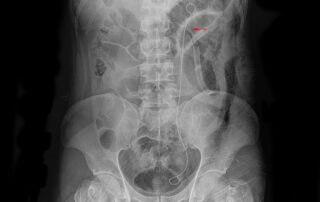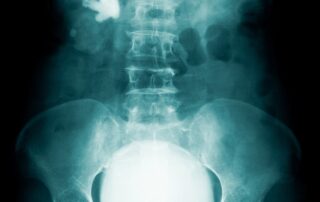Common Symptoms of Bladder Cancer in Men
If you are a man over the age of 55 and experiencing symptoms like lower back pain and difficulty urinating, it may be easy to dismiss these problems as “old age” setting in. But these symptoms can be red flags of something more serious, like bladder cancer.
The American Cancer Society estimates that in 2021 more than 83,000 people in the United States will be diagnosed with bladder cancer, the majority of which will be men. Men are three to four times more likely than women to develop bladder cancer. The good news is, bladder cancer has a five-year survival rate of 77%, and catching it early provides the best opportunity for treatment. We’re taking a closer look at why men are more susceptible than women to get bladder cancer and sharing common symptoms of bladder cancer in men, so you can spot the signs early.
Early-Stage Bladder Cancer Symptoms
About half of all bladder cancers are caught in earlier stages when the cancer is located only in the inner layer of the bladder wall. This kind of cancer is considered non-invasive. Symptoms of early-stage bladder cancer include:
- Blood in urine (hematuria). This is usually one of the first signs of bladder cancer. You may have enough blood in your urine that it appears orange, pink, or red. Sometimes the amount of blood in the urine is small enough that it does not affect the color, but a urine test performed for other health reasons will detect it. Hematuria doesn’t always mean you have bladder cancer.
Blood in the urine, and frequency of blood in your urine can vary and can indicate you have another issue like an infection, kidney or bladder stones, or non-cancerous tumors. - Changes in urination. Bladder cancer can cause changes in bladder habits, including having to urinate more often than normal, having trouble urinating, having to get up and urinate many times at night, pain or a burning sensation while urinating, difficulty urinating or a weak urine stream. These bladder problems in men can be symptoms of bladder cancer but are more often caused by other issues like a urinary tract infection, overactive bladder, enlarged prostate, or bladder stones.
Advanced Stage Bladder Cancer Symptoms
In about four percent of bladder cancer cases, the cancer has spread to other parts of the body before it is detected. Symptoms of advanced stage bladder cancer include:
- Not being able to urinate
- Loss of appetite and weight
- Lower back pain on one side
- Swelling in the feet
- Bone pain
More Questions About Possible Bladder Cancer Symptoms
With so many symptoms of bladder cancer overlapping with symptoms of other conditions, it can be easy to jump to the worst-case scenario. We’re answering more questions about bladder and urinary symptoms and whether they could be a sign of bladder cancer.
- Can recurrent UTIs be a sign of cancer? A urinary tract infection (UTI) causes many of the same symptoms as bladder cancer, including blood in the urine and changes in urination. While UTIs do not cause bladder cancer, it is possible for bladder cancer to be misdiagnosed as recurrent UTIs. If you have recurrent UTIs it is important to see a medical specialist, like a urologist, who can evaluate you for bladder cancer as well as identify and treat the cause of your recurrent UTIs.
- Is bladder cancer pain constant? Pain in the abdomen is typically not a symptom of bladder cancer. Pain or a burning sensation while urinating can be a sign of a UTI or bladder cancer, which is why it is important to see a doctor and have a thorough exam completed. If bladder cancer has spread to your bones, the pain can be persistent.
- Is white discharge in urine a sign of bladder cancer? White discharge in urine is usually a symptom of a urinary tract infection or urethritis. Urethritis is a condition in which the tube that carries urine from the bladder out of the body, called the urethra, becomes inflamed and irritated. Urethritis is usually caused by a sexually transmitted infection or trauma. Urethritis can cause difficulty urinating, pain with urination, and white discharge in urine. Male treatment for urethritis is the same as female treatment—a course of antibiotics and abstaining from sex for a period of time usually resolves urethritis.
- Is passing blood clots a sign of bladder cancer? Blood clots in the urine can be caused by many conditions. A urinary tract infection, kidney, bladder or ureter stones, and cancer of the kidney, urethra, or bladder can all lead to passing blood clots in urine. Males can also pass blood clots in urine if they have an enlarged prostate. If you are passing blood clots in your urine you need to see a doctor.
Anytime you are experiencing difficulty urinating, pain or burning while urinating, blood in urine, or other changes in bladder habits, you should schedule an appointment with a doctor who can determine the cause of your symptoms and provide a treatment plan. If caught early, bladder cancer has a high survival rate.
RELATED ARTICLES
OUR VALUES
Our mission is to better human lives through personalized healthcare and innovation.
We are committed to providing compassionate and extraordinary care by acting with attention, joy and authenticity.
We advance healthcare by aligning patients, providers and payers.
We aim to lead the way by way of innovation, excellence and the drive to change and make a lasting difference.
Patient experience is our top priority. We show this by operating with integrity, listening, and building trust with our patients and one another.
We are committed to teamwork, family spirit and embracing each other’s resourcefulness, resilience and dedication.






